"Protein Without the Meat: 8 Surprising Alternatives"

1. **Legumes**: Beans, lentils, and peas are all high in protein and fiber, making them a great addition to your diet.
2. **Tofu and Tempeh**: These soy-based products are excellent sources of protein and can be used in a variety of dishes, from stir-fries to curries.
3. **Nuts and Seeds**: Almonds, chia seeds, hemp seeds, and pumpkin seeds are all high in protein and make great snacks or additions to your meals.
4. **Whole Grains**: Quinoa, brown rice, and whole wheat bread are all good sources of protein and can be incorporated into your diet in a variety of ways.

5. **Vegetables**: Broccoli, spinach, kale, and other leafy greens are not only rich in vitamins and minerals but also contain small amounts of protein.
6. **Spirulina**: This algae-based supplement is packed with protein and can be added to smoothies or used as a dietary supplement.
7. **Seitan**: Made from wheat gluten, seitan is a meat substitute that’s high in protein and can be used in place of meat in many recipes.
8. **Mushrooms**: Certain types of mushrooms, such as shiitake and portobello, are high in protein and can be used as a meat substitute or added to dishes for extra nutrition.
Here are eight top nonmeat protein sources, their health benefits, and easy ways to incorporate them into your meals and snacks:
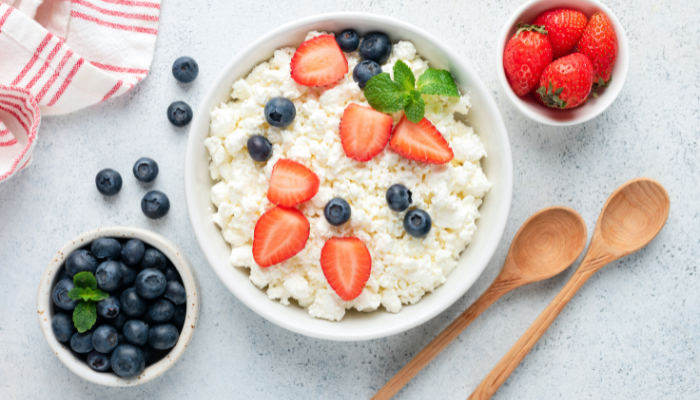
1. **Cottage Cheese**: With 24 grams of protein per cup, cottage cheese is a nutritional powerhouse that also provides significant amounts of calcium, phosphorus, selenium, and other essential nutrients.
2. **Lentils**: These small legumes are packed with protein, fiber, and various minerals, making them an excellent addition to soups, stews, salads, and stir-fries.
3. **Tofu**: With 20 grams of protein per 3-ounce serving, tofu is a versatile and nutritious meat substitute that can be marinated, baked, or stir-fried into your favorite dishes.
4. **Quinoa**: This complete protein grain provides all nine essential amino acids and contains 8 grams of protein per cup, making it an excellent addition to salads and bowls and as a side dish.

5. **Greek Yogurt**: With 20 grams of protein per 6-ounce serving, Greek yogurt is a great source of calcium, vitamin D, and probiotics that support gut health.
6. **Chia Seeds**: These tiny seeds are rich in omega-3 fatty acids, fiber, and protein, making them an excellent addition to smoothies, oatmeal, or yogurt parfaits.
7. **Spinach**: With 5 grams of protein per cup, spinach is a nutrient-dense leafy green that’s rich in iron, calcium, and vitamins A and K.
8. **Mushrooms**: Certain varieties, like shiitake and portobello, are high in protein and contain antioxidants that support immune function and overall health.
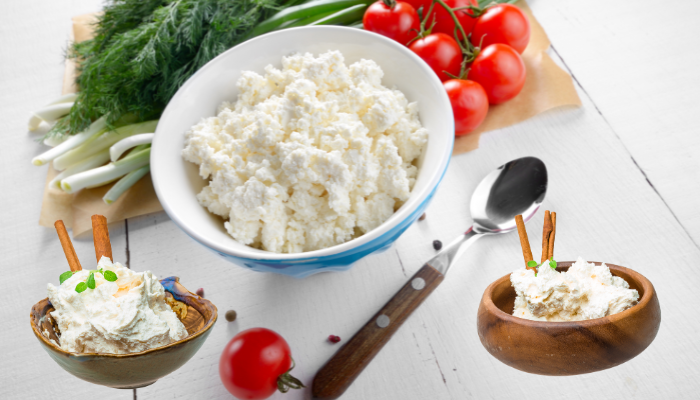
Cottage cheese has solidified its reputation as a nutritional powerhouse, not just because of its trendy appeal. One serving size of low-fat cottage cheese boasts an impressive nutritional profile. It offers 24 grams of protein, more than 22% of the recommended daily intake of calcium, and 46% of phosphorus – all of which are essential for maintaining strong muscles and bones.
Additionally, it provides a significant amount of selenium, with over 58% of the daily recommended dose, playing a crucial role in protecting cells from damage. With just 5 grams of fat, 9.5 grams of carbohydrates, and 180 calories per serving, cottage cheese is an excellent non-meat protein option that offers a balanced mix of essential nutrients.
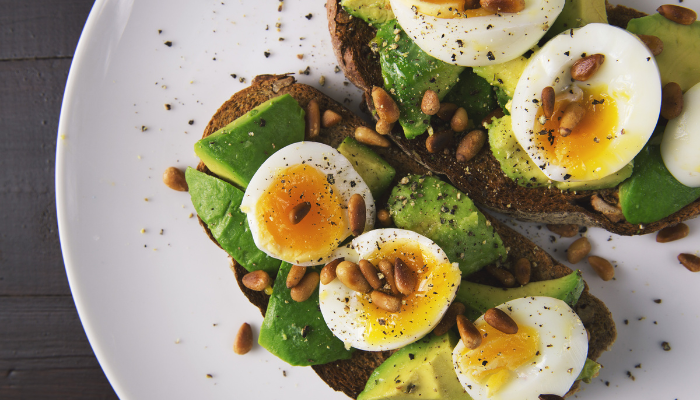
Eggs are an excellent source of protein that can be easily incorporated into your daily meals. One large whole egg contains 6 grams of protein, 5 grams of fat, and just 72 calories.
But eggs offer more than just a boost in protein – they’re also a rich source of choline, a nutrient essential for brain development and metabolism. In fact, one egg provides over 30% of an adult’s daily needs for choline.
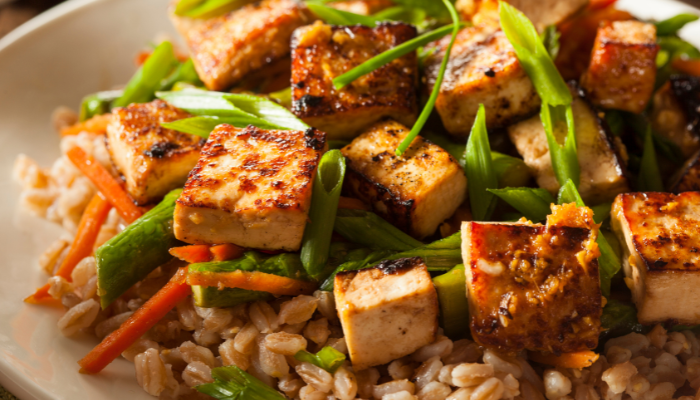
Tofu, a soy-based food, is one of the few plant-based options that provides all essential amino acids, making it a complete protein source. A 3-ounce serving of firm tofu contains 9 grams of protein, 3.5 grams of fat, and 0.75 grams of fiber, with approximately 70 calories.
Additionally, tofu is a good source of calcium, providing about 13% of adult daily needs, which supports heart health, dental well-being, and bone density. It also contains iron, meeting nearly 18% of men’s and 8% of women’s daily needs, which plays a crucial role in transporting oxygen throughout the body.
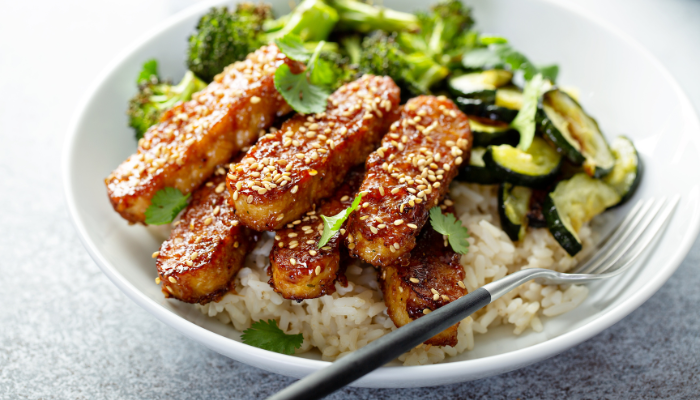
Tempeh is a nutrient-rich food made from fermented whole soybeans and sometimes mixed with grains like barley, brown rice, or millet. Its firm, chewy texture and slightly nutty flavor make it a versatile ingredient in various dishes.
In just ½ cup, tempeh provides about 17 grams of protein, 6 grams of carbohydrates, 9 grams of fat, 4 grams of fiber, and 160 calories, as well as significant amounts of essential nutrients like magnesium.

Walnuts are an incredibly nutritious food that offers a wealth of benefits for overall health and well-being. Rich in plant-based protein and alpha-linolenic acid (ALA), a type of omega-3 fatty acid, walnuts provide a boost to heart health and immune function.
Just one quarter-cup serving (about 1 ounce or 12-14 halves) contains a significant amount of ALA, which has been shown to have anti-inflammatory properties and lower cardiovascular disease risk. This makes walnuts an excellent addition to a healthy diet.

Chickpeas, also known as garbanzo beans, are a nutrient-dense food that offers a wealth of health benefits beyond their popular use in hummus. One cup of canned chickpeas provides an impressive array of vitamins and minerals, including nearly 11 grams of protein, 35 grams of carbohydrates, 9.5 grams of fiber, and 210 calories.
They’re also an excellent source of manganese, an essential mineral that plays a crucial role in immune function, bone health, reproduction, and blood clotting. Just one serving of chickpeas provides over 67% of the daily recommended intake for women and over 53% for men, making them an excellent addition to a healthy diet.

Black beans are an excellent choice for anyone looking to incorporate more plant-based protein into their diet while minimizing fat intake. Rich in essential nutrients like iron, magnesium, potassium, and B vitamins, black beans also support heart health by reducing cholesterol levels and triglycerides.
Additionally, they play a crucial role in digestion and blood sugar regulation due to their high fiber content. With just one cup of canned black beans providing 15 grams of protein, less than 1 gram of fat, and 40 grams of carbohydrates, these tiny legumes are a nutritional powerhouse.

Lentils are a nutrient-rich, plant-based protein that offers a wealth of health benefits due to their low-fat profile. With 18 grams of protein per cup of cooked lentils, they provide an excellent source of essential amino acids for muscle growth and repair.
Lentils offer a range of other vital nutrients, including 39 grams of carbohydrates, 15.5 grams of fiber, and nearly 360 micrograms of folate – a B vitamin that plays a critical role in DNA synthesis and cell division.
Incorporating these non-vegetarian proteins can enhance your diet’s variety and nutritional balance. Whether you’re avoiding meat or seeking plant-based options, these recipes provide inspiration to create balanced meals.
Embrace the versatility of protein-rich ingredients like eggs, chickpeas, black beans, and lentils to fuel your body effectively.

Menu
